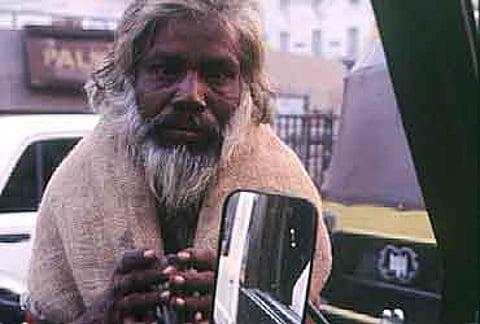The AAA activists and lawyers who represent them say that a whole range of poor people who are homeless—rickshaw-pullers, hawkers, paramedics, street performers and anybody who earns a living on the streets but does not have a home—are clubbed together as "beggars". Singh points out that 90 per cent of the homeless—there are nearly a lakh of them in Delhi—are working people. Those who are not, are "people living on the offerings of caring citizens, calling them anything else will be adding insult to injury".
But what is scandalous is that clauses (a) and (d) of the Act open up the possibility of just anybody who appears unkempt and is of no fixed address—even if that person has never asked for alms—of being dragged to the beggar's court and jailed. (Clause (a) defines begging as "soliciting or receiving alms in public place, whether or not under any pretence such as singing, dancing, fortunetelling, performing, or offering any article for sale"; clause (d) describes beggars as people "having no visible means of subsistence and wandering about, or remaining in any public place in such condition or manner, makes it likely that the person doing so exists by soliciting or receiving alms".)
The administration in Delhi regularly "cleanses" the face of the city, particularly when there is a visiting foreign dignitary or an international event and the usual suspects are loaded into police vans and taken away. Cases of people from the states trying to locate addresses in Delhi and/or running out of money and ending up on the streets are quite common. One such person gave this testimonial to an AAA activist: "I used to work in a factory. I can't go back and face my son. He studies in class 12. I've everything in my house, TV, fridge, everything. I have only one dress to wear. After eight months when I go home what would I tell my children?"
While there can be arguments against organised begging and debates over how poverty can be dealt with, there's no doubt that this Act is against all human rights and every tenet of democracy. Says Baby Mathew, ActionAid's country director, who was formerly with Bangalore's National Law School: "If there's a list of laws in India that must be repealed, this one would top my list. If there's one law which is anti-poor and anti-democracy, it is this one." Mathew points out that the IPC was written up by Lord Macaulay "off the top of his head" and although it's a tribute to the man's genius, "it is time some of these regressive laws are scrapped".
Less than a month ago, the AAA approached NHRC chairperson Justice A.S. Anand with this proposal. "Justice Anand is in favour of amendments to the Act," says Mathew, but adds they would have to be so radical that it is better repealed.
Meanwhile, the staff in the SWD at the Kingsway Camp home bristle with anger that they must be saddled with this job. "Absolute nobodies are picked up from the road and turned into vips here, we have to feed them, clothe them and ensure that they don't die, because if they do we've had it," says one of them.
Perhaps, just the kind of sentiment that will change the life of a person who is convicted for begging.
They Beg To Defer
India holds on to an archaic beggary law. The underclass falls through its loopholes.

Published At:
Tags